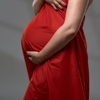Heavy periods post-birth: what to expect

Heavy periods are a problem that affect lots of women in the UK. In fact, about one in 20 women between the ages of 30 and 49 years old seek advice from their GP with heavy periods or menstrual problems. And yet it's something that still isn't spoken about openly.
It can be difficult to pin down the cause of your heavy period, but it's thought that after pregnancy, your period may be heavier and more paindul. Read on to find out more information, including when to seek medical advice.
When do you get your period after birth?
Every person is different, so it's hard to estimate exactly when your period might come back after you've had a baby.
Post-birth you'll experience bleeding known as lochia. This isn't a period, however the bleeding can be quite heavy and last for a few weeks. Eventually, it will lighten, turning from red to brown, and then stop altogether.
When it comes to your first period, some data shows that the average first day of ovulation in non-lactating women comes about 45 days to 94 days after birth. Following this, the first period would be expected at about 59 to 108 days (two to four months) after birth. One study1 even showed that ovualtion can occur as early as 25 days post-birth. Further studies have shown that the earlier your period returns, the more irregular it might be, too.
For women that choose to breastfeed, your period may return a bit later than this. It might not come back until you start to drop feeds or stop breastfeeding altogether.
Your first period after having a baby
It's normal for periods to be slightly heavier after pregnancy/having a baby. You may also find that you have increased or reduced cramping than before you were pregnant, irregular periods or small blood clots in your periods.
You may also notice that you period is heavier than normal if you've started a new contraceptive after having a baby; the coil, or intrauterine contraceptive device, can sometimes cause heavier periods.
Your first period post c-section
A C-section birth is different in many ways to a vaginal birth, and some studies have shown that there's an increased chance of heavy or painful periods after a C-section. This is generally attributed to the change and trauma to the uterine wall during the surgery to birth the baby.
When to see a doctor about heavy periods post-birth
You may want to seek medical advice, first from a pharmacy and then a GP if you experience any of the following:
- You bleed through your clothes
- You have to use two period products at the same time (e.g. tampon and a pad, a menstrual cup period pants)
- You pass large clots
- Your periods stop you from doing social, work or day-to-day activities
- You need to change your pad or tampon every one or two hours
Should you struggle with inherited bleeding disorders, including Von Willebrand disease and haemophilia, it's common to belittle the bleeding you're experiencing, or see it as 'normal'.
However, if you are worried, avoid underreporting your bleeding or your concerns. A healthcare professional will be able to provide support, advice and treatment option.
Evana should not be used during pregnancy. Ultravana should not be used during the third trimester of pregnancy.
Sources
https://www.cdc.gov/mmwr/preview/mmwrhtml/rr6205a1.htm
https://www.nhs.uk/conditions/heavy-periods/
https://www.nhsinform.scot/healthy-living/womens-health/girls-and-young-women-puberty-to-around-25/periods-and-menstrual-health/heavy-periods/
https://www.ncbi.nlm.nih.gov/pmc/articles/PMC6782019/
https://www.nhs.uk/common-health-questions/pregnancy/when-will-my-periods-start-again-after-pregnancy/
https://pubmed.ncbi.nlm.nih.gov/12255260/
https://ajosh.org/index.php/jsh/article/view/19






